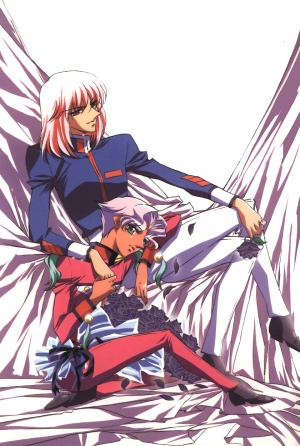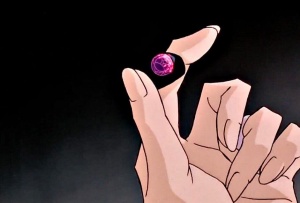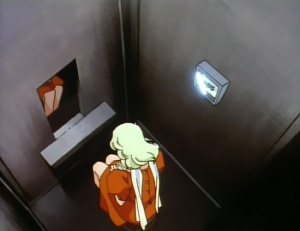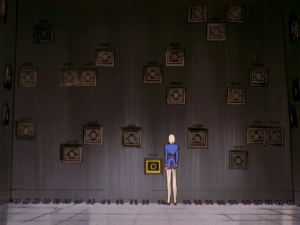Black Rose Dueling
What is Black Rose Dueling?
Dueling in Revolutionary Girl Utena is normally the provenance of only the beautiful, chosen few; the extraordinary Student Council, and a handful of others selected by the enigmatic Ends of the World.
But when Souji Mikage chooses his Black Rose Duelists, he's targeting the opposite population: ordinary people; the overlooked; the ignored; the left-behind. On Battle Fantasia, this provides a terrific opportunity to spotlight the many NPCs who tend to not show up in scenes very much due to those very attributes: non-magical friends and family.
In a Black Rose Duelist mini-arc, the NPC is the main character, played by you, the player of their magical girl PC! Over a couple weeks, you get to do a couple cutscenes and a couple scenes, and on the far side of the experience, you come away with an NPC that the whole game has gotten to know a lot better, whose personality you've gotten to explore, and whose relationship with your PC has become a lot more defined. It may have even grown a bit, in a way that couldn't have been done meaningfully off-camera.
The relationship between NPC and PC is everything, when it comes to Black Rose Duelists and their Duels. Typically, the story begins with that relationship CHANGING in some way, and/or being STUCK and, from the perspective of the NPC, in NEED of change. It could be because of the PC's newfound unavailability as she lives a mysterious double life, or because of more ordinary travails of adolescence, or for some other reason entirely -- there are as many reasons for someone to feel dissatisfied with or frustrated about a relationship as there are people.
The show itself is full of such examples:
- A little boy who is desperate to be treated as an adult by the world in general, and by one person in particular...
- A twin who wants to remain first in her sibling's heart forever, defined on her own terms rather than his...
- A girl who thinks that she is too ordinary to find love and respect, and must therefore become extraordinary...
- A social inferior who yearns to be noticed by her glamorous, forbidden crush...
- A jealous friend driven to defeat her rival through social control, thus proving her superiority to assuage her own insecurity...
In all cases, these examples have the same ending clause:
- ...but they don't know how to get what they want, and the unattainability is agonizing.
There could be mature resolutions for each of these issues, involving heartfelt conversation between responsible adults. But of course, this isn't a story about responsible adults! It's about adolescence, and passionate, uncontrollable feelings, and the helplessness of being in that in-between state, where every change feels like another death, like dying.
Enter Souji Mikage.
Mikage is not a nice person, and his corruptive therapy, which culminates in his patients accepting Black Rose signet rings possessed by hungry ghosts who are in fact also his murder victims, is not truly intended to help anyone but himself.
His end goal is to kill the current Rose Bride, Anthy Himemiya, so he can replace her with his own fixation, Mamiya Chida, superficially in order to save him from terminal illness, in actuality so they can live together forever. His METHOD is to artificially create Duelists, leveraging the strength of tumultuous relationships and melodrama to unlock the power he needs. Using manipulation, psychology, and his role as a trusted counselor, he goes about the following process to corrupt and control his victims:
- Identify a vulnerable relationship, and if it isn't already distressed, manipulate events to help it along (usually unnecessary, there's plenty of teenage drama that requires no such meddling to inflame).
- Invite his next, distraught, "patient" (victim) to Nemuro Memorial Hall for a counseling session with the illustrious Mikage Seminar.
- In this session, "help" them drill down through their feelings to "reveal" their fundamentally unresolvable obsession, framed that way for two reasons: first, to play up how helpless they are to change or fix things on their own, and second, to lead them to believe that the stakes could not be higher: their relationship drama is the end of the world.
- Having convinced his victim that they have no way out on their own, Mikage offers a miraculous solution: Black Rose Dueling, the missing agency they need, and the only option they have, embodied by a Black Rose signet ring. "Your path has been prepared for you." Once they slide on the ring, his victim is possessed by the need to walk this path.
- But the "prepared path" is in fact HIS path: by confronting the object of their obsession with their hurt feelings, then piercing their heart with a magical black rose, a Black Rose Duelist forcefully steals the sword of their soul (and leaves them unconscious). With this power that they lacked on their own, they go to the Dueling Arena with the intention to kill the Rose Bride and replace her with their fixation, with whom they can have the relationship they crave, forever, unthreatened by time, or change, or growth.
If they actually succeeded, Mikage would revoke the Black Rose power that he granted them, replace the Rose Bride with Mamiya instead, and leave their victim in the gutter. But instead, something else happens:
- In the Dueling Arena, Black Rose Duelists have the opportunity to vent their rage or pain or despair or distress. It is a dark moment, and a low point.
- But it is also a cathartic one; they are working out their issues on a grand stage in the most dramatic fashion possible.
- In the moment of their defeat, when their Black Rose is severed from their chest, their unnaturally inflamed fixation is severed also. They fall into a deep slumber, and when they awaken, nothing that bothered them is magically fixed... but it seems newly possible to move forward. In the same way that lancing an infected wound is a prerequisite to healing, the NPC now has an opportunity for long-term growth. Instead of change bringing death, it could bring rebirth.
- The NPC has no memory of events starting from the counseling session, only a sort of internal sense that they could perhaps turn a corner in their relationship if they wanted to, but the PC does: they remember being confronted, and their soul's sword torn from them and stolen away. (The PC does not know where the black rose/ring came from, though; Mikage's role in events remains invisible.)
What would playing a Black Rose arc out actually look like on Battle Fantasia?
We've never done it and it's likely to evolve with experience, but the following sequence seems likely (with additional events at the option of the player):
- Cutscene (or scene with other people around) where the PC and NPC's current relationship is spotlighted as the main topic, and the NPC leaves carrying some serious drama (obviously or otherwise).
- Scene between the NPC and Mikage, where they are invited to explore their feelings to the darkest extreme, and become a Black Rose Duelist.
- Cutscene, where the NPC confronts the PC and betrays them, stabbing them in the heart with their black rose and stealing their soul's sword.
- Scene, where the NPC duels Utena in hopes of defeating her, then killing the Rose Bride, but in fact gets to work on their issues in a fight, with some degree of catharsis granted in the moment of their defeat.
- Cutscene (or scene with other people around) where the PC and NPC meet again for the first time after the confrontation and duel. Their relationship may not change suddenly or massively, but things have the potential to grow in a healthier way.
What would be different on Battle Fantasia?
Well, obviously, not every PC is a Revolutionary Girl Utena Duelist, which means that when the NPC stabs their heart with a black rose, and drags out their "soul's sword," it may be in another form appropriate to the PC's theme. Naru Osaka might come away with Usagi Tsukino's brooch, and transform into a Black Rose-paletted version of Sailor Moon. Tomoyo Daidouji might obtain Sakura Kinomoto's Sealing Rod. It doesn't have to be the PC's transformation item; a magical girl's signature weapon or otherwise poetically appropriate magical item is fine. A Black Rose Duelist's actual transformation item could be said to be their ghost-possessed signet ring.
Regardless, when they Duel, the NPC will be fighting with the PC's full powerset. While the NPC is possessed by dark and corrupted intent, the PC's stolen powers themselves are unchanged, as shining and beautiful as ever. The NPC need not know anything about the PC's magical girl abilities before or after; they wield them with the same skill and knowledge that the PC has. In other words, a Black Rose Duelist enjoys all the strength of a magical girl, with none of the morality and non-lethal restraint, which can in fact make them much more dangerous than the PC normally is on the battlefield.
Challenges and Duels on Battle Fantasia are becoming increasingly public, and not always in the Dueling Arena, though non-magical people interpret it as afterschool fights in the yard. The Black Rose Duelist might elect to Duel somewhere meaningful to them and symbolic to the relationship they're fighting for. Although the PC can't attend as an observer (they're unconscious until their soul is freed by the destruction of the Black Rose in the duel), other PCs may be able to, and they will remember what they saw.
Finally, in a strict interpretation of the Revolutionary Girl Utena theme, no adults should be Black Rose Duelists. But if someone feels that their most compelling NPC relationship that they want to spotlight is with an adult, we'll make it work. The Chairman often involves himself with the parents of his students, after all...
This whole article has been about PC/NPC relationships! What if there's a PC/PC relationship I want to spotlight?
It's okay to have a PC Black Rose Duelist who targets another PC, with the consent of all involved, and clear understanding between all parties about what's going to happen throughout, and after, the arc. The staff will ask to be present at at least one brainstorming session to make sure everyone's on the same page.
Notable: despite being magical, a PC Black Rose Duelist still has a blank spot in their memory about Nemuro Memorial Hall and Mikage's role as their corrupter. Unlike NPCs, at the discretion of all involved, a PC Black Rose Duelist may be able to remember the confrontation with the other PC where they stabbed them with a black rose, and the duel itself.
However, as this is a particularly strong opportunity to spotlight an NPC, we strongly recommend it.
What are the themes of the Black Rose arc? What should I keep in mind about this kind of storytelling?
- The Black Rose arc is a story about adolescence. Growing up is painful, and change is hard, even when it's good. And sometimes it isn't good at all. Sometimes change just sucks.
- The Black Rose arc is a story about stasis -- which could mean being trapped in an intolerably static situation, or desperately wanting something eternal, something safe from change. Or both!
- The Black Rose arc is a story about agency. Being the NPC in a magical girl's PC's story means lacking control over events in various ways. Becoming a Black Rose Duelist is one (sad, manipulated) way of taking control of their own story.
- The Black Rose arc is a story about cycles of abuse. Mikage is abusing the trust of his 'patients' to turn them into his victims, targeting people when they're at their most vulnerable; his manipulated NPC victims in turn betray the PC they care about the most, by taking what they need to get what they want. And secretly, Mikage is also a victim of Ohtori Academy. As he manipulates his victims to serve his goals, he too is unknowingly being manipulated to serve the goals of another.
- The Black Rose arc is a ghost story. It is dark, but also mysterious, and some things will never be fully explained.






